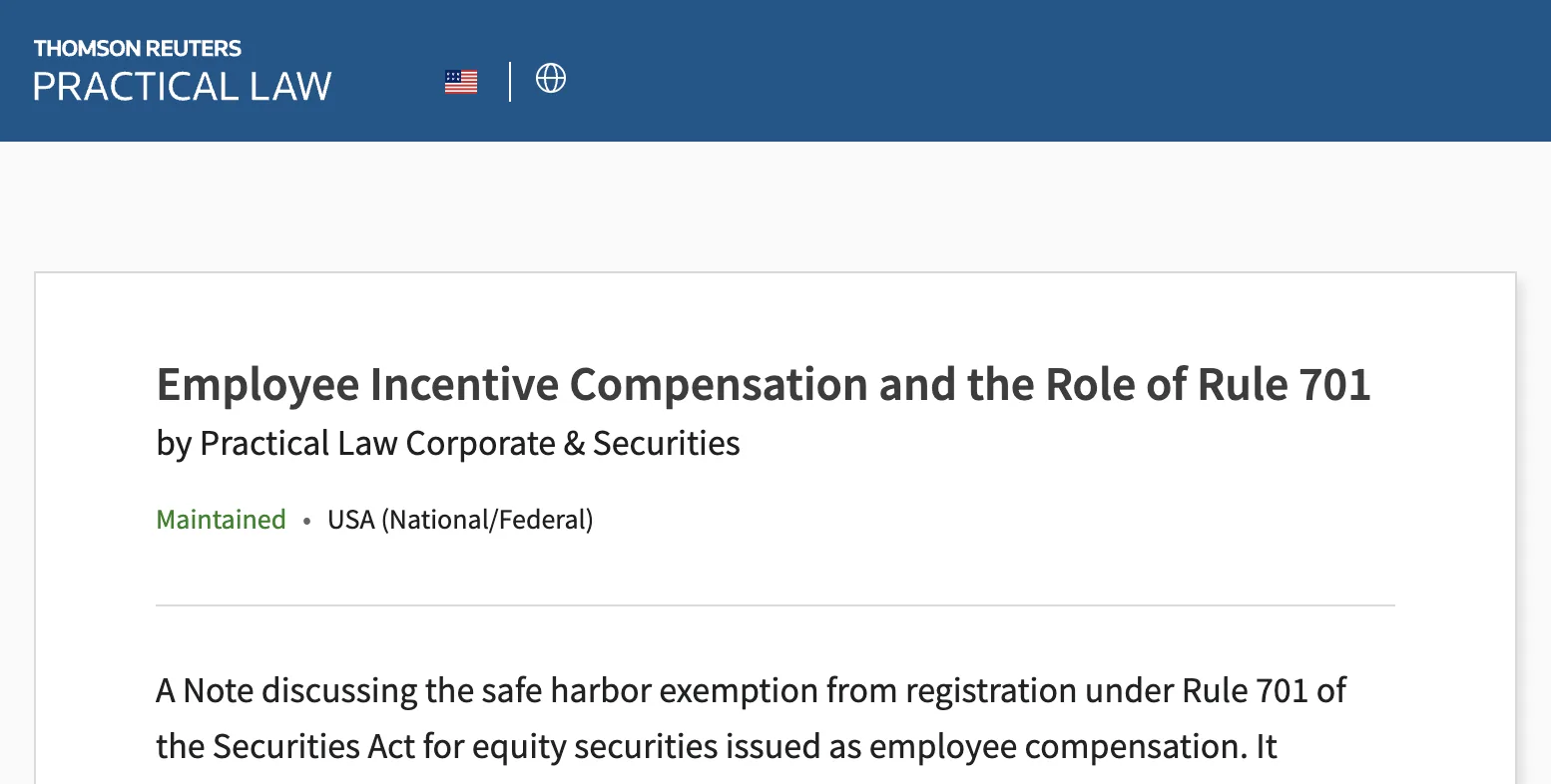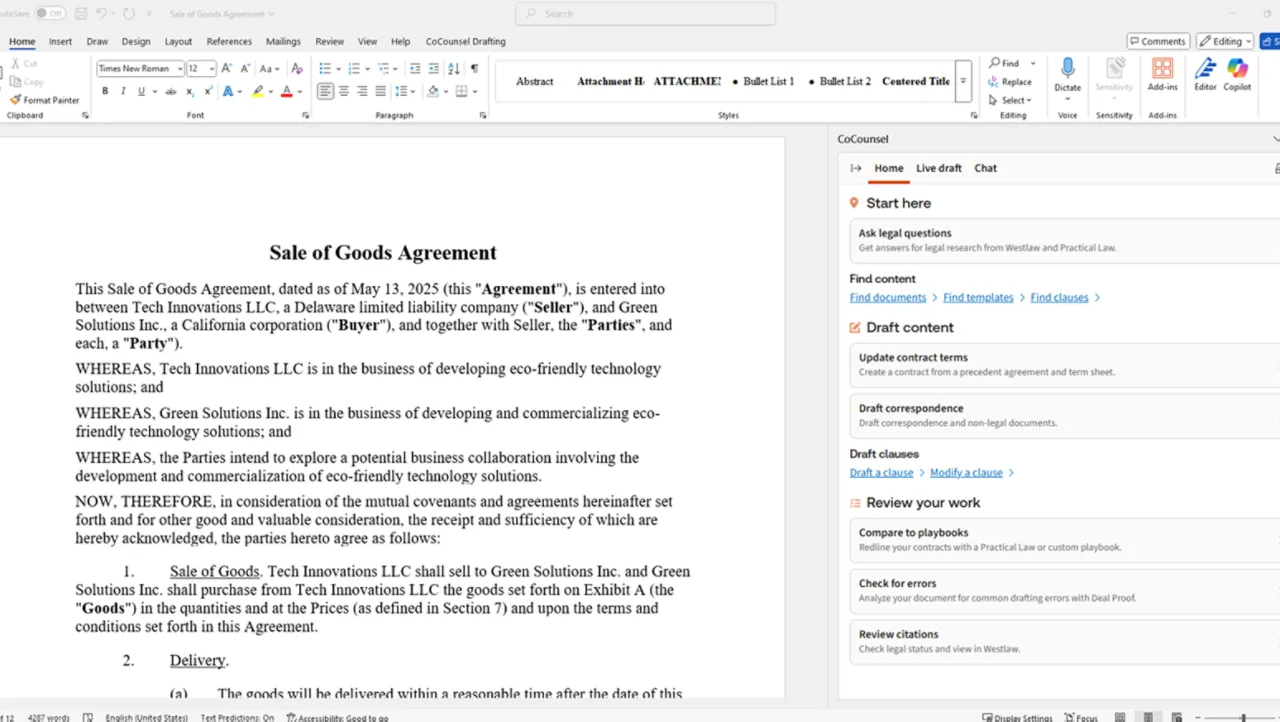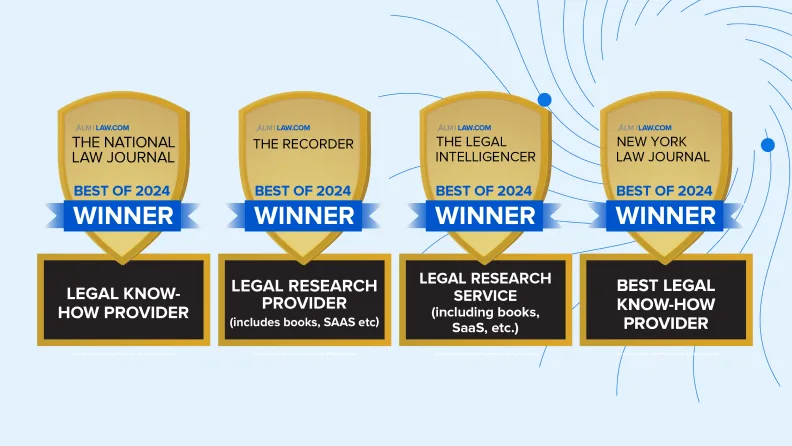Overview of eligibility, conditions, limitations, restrictions, and compliance
Securities Law · Rule 701
Highlights
- Rule 701 of the Securities Act of 1933 provides a critical exemption for private companies to issue securities as compensation.
- Compliance hinges on having a written compensatory plan and adhering to disclosure requirements.
The Securities Act of 1933 is a foundational piece of legislation in the United States that regulates the offer and sale of securities. Within this act, numerous rules and exemptions provide frameworks for companies to raise capital while ensuring investor protection.
One such exemption is Rule 701, which allows private companies to offer and sell securities to their employees, consultants, and advisors without registering the securities with the Securities and Exchange Commission (SEC).
This guide aims to provide a basic overview of Rule 701, its eligibility criteria, disclosure requirements, limitations, and comparisons with other exemptions, as well as recent developments and best practices for compliance.
Jump to ↓
What is Rule 701?
Eligibility and conditions for Rule 701
Limitations and restrictions of Rule 701
Comparison with other exemptions
Recent developments and updates

Employee Incentive Compensation and the Role of Rule 701
A Note discussing the safe harbor exemption from registration under Rule 701 of the Securities Act for equity securities issued as employee compensation
Access with free trial ↗What is Rule 701?
Rule 701 is an exemption from the registration requirements of the Securities Act of 1933, specifically designed for private companies that wish to issue securities to their employees, consultants, and advisors as a form of compensation.
The purpose of Rule 701 is to facilitate the use of equity compensation by private companies, thereby aligning the interests of employees with those of the company’s shareholders. This rule is particularly beneficial for startups and growing private companies that may not have the cash flow to compensate their employees and advisors competitively but can offer them a stake in the company’s future success.
The Securities Act of 1933 requires that any offer or sale of securities using the means of interstate commerce must be registered with the SEC unless an exemption is available. Rule 701 provides such an exemption, allowing private companies to issue securities under certain conditions without the need for registration. This exemption is crucial for the growth and development of private companies, as it enables them to attract and retain talent by offering equity-based compensation.
Eligibility and conditions for Rule 701
Not all companies are eligible for the Rule 701 exemption. Generally, the rule applies to private companies, including corporations, partnerships, and limited liability companies.
To rely on Rule 701, the company must meet specific conditions. One key condition is that the securities must be offered and sold pursuant to a written compensatory plan or contract. This includes stock option plans, stock purchase plans, and other equity-based compensation arrangements.
To understand the full eligibility criteria including who qualifies as participants and what types of securities are covered, see Employee Incentive Compensation and the Role of Rule 701.
Interplay with Section 12(g) of the Exchange Act
Rule 701 provides a safe harbor exemption, but it cannot be relied upon for capital-raising purposes. This is where the application of Section 12(g) of the Exchange Act becomes significant.
Under Section 12(g)(1), an issuer is required to register a class of securities if it has more than $10 million in assets and either (a) 2,000 record holders, or (b) 500 holders who are not accredited investors.
As per the amendment by the JOBS Act, Rule 701 securities are excluded from the “held record” count under Section 12(g)(5). This allows the private companies to issue equity compensation without triggering public company registration.
Disclosure requirements under Rule 701
The disclosure requirements under Rule 701 depend on the aggregate sales price or amount of securities sold during any consecutive 12-month period. For amounts up to $10 million, no specific disclosures are mandated by the rule. However, for transactions exceeding $10 million, the company must deliver disclosures that include:
- Financial Statements: The company’s financial statements, which must be as of a date no more than 180 days before the date of the sale.
- Risk Factors: A summary of the risk factors associated with the investment, which could include the company’s financial condition, industry risks, and other factors that could affect the value of the securities.
To understand the full context and list of disclosure requirements, see Employee Incentive Compensation and the Role of Rule 701.
These disclosures must be provided a reasonable period of time before the date of sale or, in cases where the plan only permits issuances for a fixed price, a reasonable period of time before the date the person becomes contractually committed to purchase.
Limitations and restrictions of Rule 701
Rule 701 comes with certain limitations and restrictions. One of the primary limitations is the aggregate sales price or amount of securities that can be sold. While there is no specific cap on the amount that can be sold under Rule 701, the rule requires increased disclosures once the $10 million threshold is exceeded in a 12-month period.
Additionally, Rule 701 is often compared with other exemptions, such as Rule 504 and Rule 506 of Regulation D.
Rule 504 allows companies to offer and sell up to $5 million of securities in any 12-month period, with limited disclosure requirements.
Rule 506, particularly Rule 506(b) and Rule 506(c), offers exemptions for larger, more sophisticated offerings but comes with stricter requirements, including the accreditation of investors in the case of Rule 506(b) and the verification of accredited investor status for Rule 506(c).

CoCounsel Legal
Work smarter with AI, trusted content, and expert insight from Westlaw and Practical Law for securities offerings.
Go professional-grade AI ↗Blue Sky Laws
In practice, companies and their counsel need to pay close attention to State Securities Laws, also known as Blue Sky Laws, when issuing securities under Rule 701. This is because securities issued under Rule 701 do not qualify as “covered securities” under the National Securities Markets Improvement Act of 1996, and therefore may still trigger state-level compliance requirements.
The company must either register or qualify for an exemption from registration for the securities at the state level.
A company is required to comply with the Blue Sky Laws in the following situation:
- wherein the company grants equity awards
- the company’s principal place of business
- the company’s state of incorporation
Some state-specific requirements may include notice filings and fees. Other states such as California impose substantive review and pre-clearance. Some states offer exemptions mirroring Rule 701 for private company equity awards, but these are not uniform.
The applicable requirements are state-specific and vary depending on a number of factors, including;
- The exemption from the Federal Securities Registration which is being relied on
- The state in which the recipient of securities resides, or
- The number of recipients in each state
Compliance and record-keeping
Compliance with Rule 701, including its disclosure requirements, is crucial to avoid violations of the Securities Act. Companies must maintain accurate records of all securities issued under Rule 701, including the date of issuance, the number of securities issued, and the individuals to whom they were issued.
Failure to comply with Rule 701 can result in severe consequences, including SEC enforcement actions, fines, and potentially even the rescission of the securities sold.
Comparison with other exemptions
Choosing the right exemption for a securities offering depends on several factors, including the size of the offering, the type of investors, and the company’s specific needs. Rule 701 is tailored for compensatory arrangements and may not be suitable for capital-raising transactions.
In contrast, Rule 506(b) and Rule 506(c) are more geared towards larger capital raises and require all non-accredited investors to receive disclosure documents similar to those used in registered offerings.
Recent developments and updates
The SEC periodically reviews and updates its rules to reflect market developments and to ensure the rules remain effective in their purpose.
Changes to Rule 701 have aimed to expand its applicability and simplify compliance, particularly for smaller companies. For instance, the SEC has increased the threshold for mandatory disclosures under Rule 701, recognizing the needs of growing private companies.

SEC Filings & Precedents
Access registration statements, periodic reports, exhibits, and forms filed by publicly traded companies with Practical Law
View Practical Law plans ↗What is Practical Law?
Practical Law is the most trusted and award-winning legal know-how provider. Resources include standard documents, checklists, legal updates, how-to-guides, and more.

92% of customers agree Practical Law helps them get up to speed and practice more efficiently
Over 650 full-time experienced attorney editors globally keeping you up to date
118,000+ total resources across 17 practice areas ensuring comprehensive coverage
134,000+ hours spent in 2024 maintaining and updating resources








